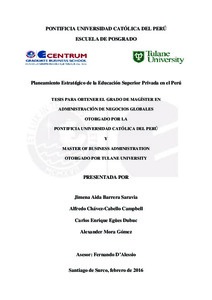| dc.contributor.advisor | D’Alessio Ipinza, Fernando Antonio | |
| dc.contributor.author | Barrera Saravia, Jimena Aida | es_ES |
| dc.contributor.author | Chávez-Cabello Campbell, Alfredo | es_ES |
| dc.contributor.author | Egües Dubuc, Carlos Enrique | es_ES |
| dc.contributor.author | Mora Gómez, Alexander | es_ES |
| dc.date.accessioned | 2017-02-09T15:39:23Z | |
| dc.date.available | 2017-02-09T15:39:23Z | |
| dc.date.created | 2016 | |
| dc.date.issued | 2016 | |
| dc.identifier.uri | http://hdl.handle.net/20.500.12404/7725 | |
| dc.description.abstract | Para desarrollar un país, se deben construir las bases necesarias que permitan proyectos sostenibles y a largo plazo, los cuales están apalancados en una buena educación y formación de los ciudadanos que conforman una sociedad; razón por la cual se toma la decisión de tratar el tema de educación. Después de realizar una investigación más a profundidad de la educación en el Perú, se considera hacer el Planeamiento Estratégico de la Educación Superior Privada en el Perú, puesto que a 2015 está pasando por un proceso de transformación importante y decisivo para el futuro del País. Para obtener las recomendaciones se ejecutó la metodología del Proceso Estratégico, mediante el cual se logró entender en qué situación se encontraba la Educación Superior Privada.
Se entendió que el Decreto Ley Nº882 (1996) fue necesario para el Perú, puesto que incentivó la creación de universidades privadas con el objetivo de atender la demanda de educación. Este hecho se presentaba como una importante iniciativa del Gobierno y con lo cual se avizoraba un buen porvenir; sin embargo, el problema fue la creación de las universidades sin control y estándares mínimos de calidad educativa. En 2014 ocurrió el primer avance con la promulgación de la Ley 30220 que definía los estándares de calidad, procesos de acreditación y licenciamiento, creaba la SUNEDU, y establecía un marco legislativo y regulatorio sobre la creación de universidades.
Las recomendaciones descritas soportan la misión definida, ayudando a lograr la visión trazada, soportado en los seis OLP definidos y las nueve estrategias retenidas, todo medido a través de un BSC, con el fin de lograr una educación superior peruana con altos estándares de calidad y enfocadas en tener un sistema de educación privado, de calidad, accesible, con infraestructura y certificado, con sólidas bases de ética y responsabilidad social, que apoyen el crecimiento de la sociedad y hagan del Perú un País más desarrollado y con más oportunidades para todos | es_ES |
| dc.description.abstract | The most important investment a country should make is to look into its very foundation, for which an excellent education, represents the very source of success, production, employment and entrepreneurship. After analyzing general education in Peru, we decided to emphasize this document on Strategic Planning for superior private education, since it is undergoing a transformation process aligned with the economic and social changes happening in the country, and because it is an area of decisive action towards the country’s success. In order to achieve the many recommendations we have proposed to the system, we have used the Strategic Process methodology, with what we have understood and evaluated the current context for superior private education in Peru today.
We have understood that in 1996 the DL 882 was necessary because the country was in need to increase the number of education establishments in order to attend the growing demand of students. However, the problem that later arised was that the growth of universities was given without control and minimum standards, focusing only in growth, without taking quality levels into consideration. In the year 2014, when Law 30220 came into place, there was big advancements since finally there was a quality guidance that for instance established that to be a bachelor university professor. This is how the SUNEDU was created, entity which defined not only legislative processes but also enforced a specific licensing and structure on universities.
The suggestions we are recommending are aligned with the mission, helping to accomplish the vision, with six long term objectives and nine strategies retain, measure, and control by a BSC, which strongly support quality education, specifically focusing on having a superior private education sector that both achieves quality education and access to as many Peruvians as possible, infrastructure, and solid moral foundations, always motivating activities such as sport; with the sole motivation of progress in our country and more opportunities for everyone | es_ES |
| dc.language.iso | spa | es_ES |
| dc.publisher | Pontificia Universidad Católica del Perú | es_ES |
| dc.rights | info:eu-repo/semantics/openAccess | es_ES |
| dc.rights.uri | http://creativecommons.org/licenses/by-nc-nd/2.5/pe/ | * |
| dc.subject | Educación | es_ES |
| dc.subject | Planificación estratégica | es_ES |
| dc.title | Planeamiento estratégico de la educación superior privada en el Perú | es_ES |
| dc.type | info:eu-repo/semantics/masterThesis | es_ES |
| thesis.degree.name | Maestro en Administración de Negocios Globales | es_ES |
| thesis.degree.level | Maestría | es_ES |
| thesis.degree.grantor | Pontificia Universidad Católica del Perú. CENTRUM | es_ES |
| thesis.degree.discipline | Administración de Negocios Globales | es_ES |
| renati.advisor.dni | 41319855 | |
| renati.advisor.orcid | https://orcid.org/0000-0002-4242-1220 | es_ES |
| renati.discipline | 413307 | es_ES |
| renati.level | https://purl.org/pe-repo/renati/level#maestro | es_ES |
| renati.type | https://purl.org/pe-repo/renati/type#tesis | es_ES |
| dc.publisher.country | PE | es_ES |
| dc.subject.ocde | https://purl.org/pe-repo/ocde/ford#5.02.04 | es_ES |






